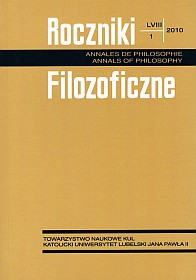Istota (bytu) w ujęciu Arystotelesa i św. Tomasza z Akwinu
Abstrakt
In ancient and medieval philosophy three traditions may be pointed to, in which three conceptions were formed of understanding of the essence. One of them is the identity conception of the essence, according to which “essence” is another name for pre-element. The second one may be called epistemological; according to this conception the essence is what is signified with the definition of the thing. And the third conception may be called metaphysical (relational), where the essence is understood as one of the constitutive elements of being that may fulfill the function of the subject, and also of the correlate of the act of existence.
The problem of understanding the essence of being, especially in Aristotle’s philosophy, lies at the foundations of the so-called essentialist philosophies, that is ones, for which something general, constant and unchanging, with different statuses of being, are the subject of analyses. No wonder then that the accepted conception of the object of academic study of cognition and the general conception of cognition are at the foundations of understanding of the essence (of being). For this reason the issue of understanding the essence (of being) does not occur in the non-compositional conceptions of being and interpretations of reality that tend to monism, but it does appear and assumes the form of a dispute, along with accepting the compositional conception of being and distinguishing of the cognition order and the being order, which we first of all owe to Aristotle. He tied understanding of the essence with the proper object of philosophical cognition.
In the Middle Ages the issue of the essence (of being) assumed a new form of explanation owing to St Thomas Aquinas. He tied understanding of the essence and its correlate, that is the act of existence, and rejected understanding of the essence as an arrangement of necessary features, which are realized on various levels of being: in individuals, in cognitive approaches (generic), and in pure capacities that were induced by Avicenna and developed by John Duns Scott and other philosophers of that age. It is owing to these two latter ones that the issue of the essence was transferred from metaphysics to epistemology and became binding for essentialist trends in modern and contemporary philosophy.
Bibliografia
Awicenna: Księga wiedzy, przeł. B. Składanek, Warszawa 1974.
Böhner Ph., Gilson É.: Historia filozofii chrześcijańskiej, przeł. S. Stomma, Warszawa 1962.
Die Fragmente der Vorsokratiker, hrsg. H. Diels, W. Kranz, 6. verb. Aufl., Bd. 1-3, Berlin 1951-1952.
Diogenes Laertios: Żywoty i poglądy słynnych filozofów, tłum. I. Krońskia [i in.], wyd. 5, Warszawa 2004.
Gilson É.: Byt i istota, przeł. P. Lubicz, J. Nowak, Warszawa 1963.
Krąpiec M.A.: Byt i istota. Św. Tomasza „De ente et essentia” przekład i komentarz, wyd. 2, Lublin 1994.
Krąpiec M.A.: Filozofia co wyjaśnia? Filozofia w teologii, Lublin 2000.
Maryniarczyk A., Paź B.: Istota, [w:] Powszechna encyklopedia filozofii, red. A. Maryniarczyk, t. 5, Lublin 2004, s. 85-112.
Platon: Timaios, [w:] tenże, Dialogi i poglądy, przeł. W. Witwicki, t. 2, Kęty 1999.
S. Thomae Aquinatis In Metaphysicam Aristotelis commentaria, cura et studio M.R. Cathala, Taurini 1915.
S. Thomae Aquinatis Summa contra Gentiles, ed. P. Marietti, 2 ed., Taurini 1888.
Zieliński E.: Nieskończoność bytu Bożego w filozofii Jana Dunsa Szkota, Lublin 1980.
Copyright (c) 2010 Roczniki Filozoficzne

Utwór dostępny jest na licencji Creative Commons Uznanie autorstwa – Użycie niekomercyjne – Bez utworów zależnych 4.0 Międzynarodowe.





